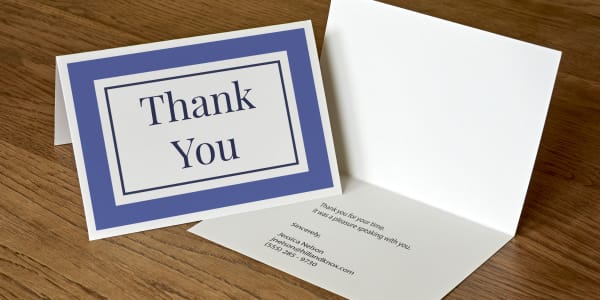Preparation is key to success
Congratulations! Your impressive resume and cover letter have landed you an interview. Now all you have to do is convince your future employer you’re the one for the job.
However, if you’re worried a remote interview might make it difficult to show off your confidence and skills, don’t be. Preparing ahead of time will ensure you’re ready for anything that can pop up during your interview.
Use our 9 tips to help make the best impression possible during your remote interview and score the position you want.
Other resources you might like:

1) Prepare reference materials
First things first: gather all the information you may need before, during and after your interview. Here are some important resources to have:
- Your resume
- A list of references
- Personal performance data (like certifications, awards, etc.)
- Notes on the company
- Any subjects/questions you would like to bring up
Having hard copies nearby will make it easy to reference during the interview process. In fact, consider making multiple copies of your resume and references so you can send them out if requested.
Remember that organization is essential. Use a report cover or binder to keep your papers in order so you can reference the information you need on the spot or send out your material promptly when asked.
Pro Tip: Having both digital and physical copies of documents makes it easy to email, fax or mail them as needed. Remember that organization is essential.
2) Check your background
Like with in-person interviews, you’ll want to present a neat and professional appearance from the get-go. Start by being mindful of your background. Remove any unprofessional items or anything you wouldn’t want your colleagues to see.
While personal items are great for adding a human touch, be cautious about privacy. Consider whether you want family photos or kids’ artwork with names displayed.
Your background should be simple and professional, but avoid having just a blank wall behind you. Add interest with some nice artwork or a smartly decorated bookcase.
You can also find a wide range of free digital backgrounds suitable for the occasion, along with detailed instructions on how to change them.
3) Get the lighting right
One thing you might not have considered that can impact your remote interview is the lighting. Even if the room is brightly lit, where the light is coming from can affect the image quality and cause unneeded distractions.
Keep in mind that side-lighting often creates unflattering shadows, while back lighting creates silhouettes. It’s best to have your light source in front of you with the light shining toward your face.
If you don’t have a good light source, consider getting a ring light that clips onto the top of your laptop or webcam.
4) Pay attention to the camera angle
Along with bad lighting, the wrong camera angle can also cause unwanted distractions during your video call, so make sure you find the perfect placement before the big day.
Check that your entire face and upper body are within frame and as centered as possible. Also make sure that the picture isn’t zoomed in or blurry.
Remember that eye contact is essential, so place your camera at eye-level and look directly at it throughout the call. If needed, use a laptop stand or stack of books to achieve the right height.
And don’t forget to sit up straight. Not only are good posture and eye contact perfect indicators of self-confidence, but they also let others know you are alert and engaged in the conversation.
5) Do a practice run with a friend
As the saying goes, practice makes perfect, so don’t be afraid to do a practice interview, or two, with a friend. Not only will this help with the technical aspect of the interview, it may also help calm your nerves.
Conduct a test run a week ahead of your remote interview. This should give your enough time to troubleshoot any problems or get additional equipment if needed.
Ask your friend take screenshots so you can see what your set up looks like from the other side of the camera. Check that your background, lighting and camera angle are set up the way you want them.
This is also a good time to check your audio quality, which includes your microphone and speakers. Make sure there isn’t any static or feedback and that you can hear each other clearly.
Also pay attention to your Wi-Fi signal during your practice interview. Lagging video, distorted audio and dropped calls can all be signs of a weak signal.
If you feel like you need to boost your signal, consider moving closer to your router or using a Wi-Fi extender/signal booster for greater/stronger coverage.

6) Dress for success
Even if you’re not going anywhere, it’s still a good idea to dress up. It is a job interview after all, so go ahead and dress the part.
Dressing head-to-toe will also put you in the interview mindset. You may find that you carry yourself differently when you’re all put together than when in pajamas and fuzzy slippers.
Start off with a fresh, clean complexion, combed hair and neatly groomed facial hair. Your hands and nails should also be clean and your makeup and jewelry should be business appropriate.
A nice blouse, shirt and tie are a must, but if the company is more formal add a blazer or suit jacket. You’ll want to present yourself as a professional, so save your cozy t-shirt and sweats for after the interview.
7) Be present and attentive
It’s important to show that you’re invested during an interview, but that might be hard when there are so many distractions at home. Ensure that all potential interruptions are removed ahead of time.
Let your entire household know when and where you are conducting your interview. Ask to be left alone during that time and that noise be kept to a minimum. If you have kids, reach out to friends or family to babysit.
During the interview, stay focused by silencing your phone, or even turning it off completely. Turn off all notifications on your computer and close any non-essential windows, projects and apps.
8) Take notes the old fashioned way
Keep up the professional appearance by making sure you don’t appear distracted during your remote interview. As mentioned, eye contact is important, so keep your gaze on the camera as much as possible.
Typing on your computer can look like you’re not paying attention or working on something else, so avoid it if you can. Instead, write your notes by hand so they can see what you are doing.
Here are some helpful phrases you can use to let the interviewer know what you plan to do:
- Would you mind if I take notes?
- Please don’t mind my pen scratching, I’ll be jotting down important notes as we go.
Pro Tip: Whether in person, or online, always bring a notepad and pen to an interview. It shows the interviewer that you’re engaged, prepared and seriously reviewing information provided.
9) Follow up after the meeting
It’s always a good idea to follow up after an interview to express your gratitude and reaffirm that you are still interested in the position. A thank you email is a must, and can be sent within a few hours of your interview.
If you really want to stand out though, send a physical thank you card as well. Be sure your interviewer works in-office at least part time and mail it off.
You can create and print cards ahead of time, then add a sincere handwritten message after the interview. Send it within one business day, or same-day if your interview is on a Friday.
Pro Tip: Get the best printing results by choosing notecards specifically optimized for your inkjet or laser printer.
Be prepared to ace your remote interview
Keep in mind that while the discussion portion of an interview is the same whether remote or in-person, remote interviews have some added aspects that should be addressed ahead of time.
Hopefully these tips will help you plan and organize beforehand so you’ll be ready to take on your online interview with ease.
Even if you don’t have an interview lined up, you can use these tips to be ready when the time comes.
With remote interviews becoming more common, stay ahead by perfecting your video call skills today.
Do you have any good interview tips to share? Let us know below or connect with us on LinkedIn or Facebook.





Love this – it is very informative with great suggestions. Thanks for sharing.